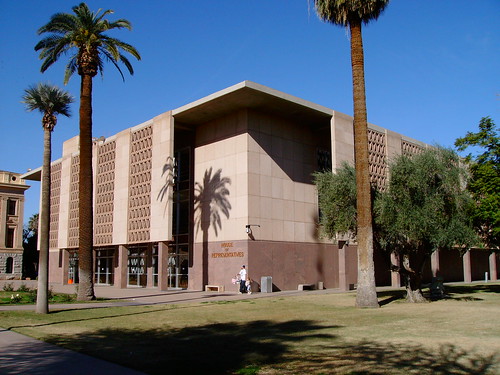 [Source: Steve Bodinet, NewsChannel 3] — Due to the budget crisis, could Arizona soon be the only state without a state park system? Interviews with a state parks official and members of Arizona’s House of Representatives. [Note: To view the news segment, visit Arizona only state without state park system?]
[Source: Steve Bodinet, NewsChannel 3] — Due to the budget crisis, could Arizona soon be the only state without a state park system? Interviews with a state parks official and members of Arizona’s House of Representatives. [Note: To view the news segment, visit Arizona only state without state park system?]
Warde Nichols
House kills measure that would re-open Arizona state parks on full-time basis

[Source: Howard Fischer, Capitol Media Services] — The state House lawmakers killed legislation Tuesday that would have provided money to reopen state parks on a full-time basis. A total of 36 legislators voted for the measure that would have taken $20 million from a special account designed to deal with urban sprawl and given some of that to the state Parks Board to compensate for cuts in the agency’s budget made by lawmakers in January. But HB 2088 needed 45 votes because the fund was created by voters in 1998. And the Arizona Constitution requires a three-fourths margin of the 60-member House — and the 30-member Senate — to alter what voters have approved.
Deputy Parks Director Jay Zieman said Tuesday’s action means five parks will remain closed two days a week to save money. It also delays the reopening of three other parks that were shuttered entirely, at least in part to cut costs. The defeat came when every House Democrat except one refused to support the measure.
Rep. Chad Campbell, D-Phoenix, said he was sympathetic to the needs of the Parks Department. But he questioned the legality of the move. He pointed out that the constitution forbids lawmakers from tinkering with any program approved by voters. He said the only exception, even with a three-fourths margin, is when a change “furthers the purpose’ of the underlying measure. In this case, he said voters approved providing $20 million a year for 11 years to help purchase or lease state trust lands in urban areas to keep them out of the hands of developers. Funding the operation of parks, said Campbell, does not do that. He also said raiding voter-approved funds sets a “bad precedent.”
None of that placated Zieman. “We expect to have $98 million in that fund at the end of the fiscal year,’ he said. “It is maddening to be in a position where you’re closing parks’ because 30 percent of the staff has been let go.
The state has closed Tonto, McFarland and Jerome state parks, though some of the reason they were chosen because of work that needs to be done at each site. What was not anticipated was the need to go to a five-day-a-week schedule at six other parks: Fort Verde, Oracle, Tombstone Courthouse, Tubac Presidio, Yuma Territorial Prison, and the Yuma Quartermaster Depot. The state is saving money by chaining them closed on Tuesdays and Wednesdays. Aside from the closures and reduced schedules, Zieman said his agency also has suspended funding grants, even in cases where groups had been given the go-ahead and work had been started.
Rep. Warde Nichols, R-Gilbert, who crafted the legislation, said the move made sense not to tap the funds which “are doing absolutely nothing for our state right now.” One reason there is so much money in the account because the 1998 law requires that taxpayer funds be matched by other sources, whether public or private. Those matching funds have not materialized. Beyond that, Nichols said the economy has slowed development to the point where builders are not buying up large swaths of state land. And Nichols said the funding is just a loan: The legislation would have required the state to put back the $20 million in the future.
But Rep. Steve Farley, D-Tucson, said that payback is not guaranteed, as future lawmakers could simply vote to ignore the mandate. [Note: To read the full article, click here. To read the Camp Verde Bugle’s editorial on this subject, click here.]
Arizona State Parks board puts off decision on closing parks

[Source: Daniel Newhauser, Cronkite News Service] — With one round of legislative budget cuts behind him and more looming, Arizona State Parks Executive Director Ken Travous said Friday that heart-wrenching decisions eventually will need to made about closing parks. “Right now, were having to decide which of our children we’re going to feed,” he told members of the Arizona State Parks Board. “And they’re all my children.”
Board members decided Friday to wait on adding to three parks already shuttered until the Legislature determines how much it plans to cut from the Arizona State Parks’ budget for the fiscal year beginning in July. However, the board granted the agency authority to limit park hours by up to two full days per week if necessary. After trimming operations and cutting grants for parks, trails and historic preservation, the agency has enough money to operate remaining parks if lawmakers don’t cut anything, Travous said. But it would be a pipe dream to think they won’t, he added. Travous said he expects cuts of up to $12 million for fiscal 2010 against a total budget of around $23 million.
Meanwhile, the board unanimously agreed to support HB 2088, sponsored by Rep. Warde Nichols, R-Chandler, which would help prevent park closures by temporarily reallocating money from the Growing Smarter Fund voters created in 1998 to conserve land. That legislation, which would require a three-quarters vote from both chambers, was awaiting a final vote in the House. [Note: To read the full article, click here.]
San Xavier could be hurt by decision that saves Arizona state parks

[Source: Jonathan J. Cooper, Cronkite News Service] — Late last year, crews removed scaffolding that covered the west tower of San Xavier Mission. Preservation experts had spent years removing a concrete coating, replacing disintegrating brick and restoring the original lime mortar cover.
Restoration work was supposed to move this year to the mission’s east tower, where the structure is disintegrating from the inside. But the scaffolding could stay on the ground and the tower could continue to slowly crumble now after lawmakers closing the state’s budget deficit swept millions from a fund that had committed $150,000 in lottery proceeds to the work here. “The whole thing is frustrating because you want to believe the state lives up to its word,” said Vernon Lamplot, executive director of Patronato San Xavier, a nonprofit organization created to restore the 212-year-old mission south of Tucson.
An Arizona icon dubbed “The White Dove of the Desert,” San Xavier stands a vision of contrasts. One tower is gleaming white, while the other has yellowing paint and mold. The exterior is cracked, with stucco falling from the brick walls. The restoration at San Xavier is one of about 120 projects, some already under way, that stand to lose grants from the Heritage Fund, which designates up to $20 million of state lottery revenue annually for parks, trails, historic preservation, and wildlife conservation. Voters created the fund in 1990.
There is some hope for the grants. A bill by Rep. Warde Nichols, R-Chandler, was amended to reallocate money to help prevent some state parks from closing and, among other things, replace the $4.9 million swept from the Heritage Fund. A House committee endorsed the bill, but it would require a three-quarters vote from both chambers to pass. The plan may prove unpopular because it would take the money from the Growing Smarter Fund voters created in 1998 to conserve land.
The dozens of Heritage Fund grants around Arizona are especially important now to stimulate the economy and encourage tourism, said Doris Pulsifer, grants director for Arizona State Parks, which administers much of the money. “To develop these projects provides jobs because someone has to go out there and build them,” she said. “And money is spent on the equipment and the materials.”
 Dennis Hoffman, an economics professor at Arizona State University’s W.P. Carey School of Business, said the Heritage Fund grants probably do create some jobs and have a small economic benefit. But he said it’s hard to argue that one state program is more beneficial than another as they all fight for a dwindling number of dollars. “You’ve got a million ducks fighting over two croutons,” Hoffman said. “We need more croutons. There’s just not enough money going around to fund everything that most Arizonans would agree needs to be funded.”
Dennis Hoffman, an economics professor at Arizona State University’s W.P. Carey School of Business, said the Heritage Fund grants probably do create some jobs and have a small economic benefit. But he said it’s hard to argue that one state program is more beneficial than another as they all fight for a dwindling number of dollars. “You’ve got a million ducks fighting over two croutons,” Hoffman said. “We need more croutons. There’s just not enough money going around to fund everything that most Arizonans would agree needs to be funded.”
Beth Woodin, president of the Arizona Heritage Alliance, an organization that lobbies the Legislature to continue supporting the Heritage Fund, said the sweep shows a lack of commitment to historic preservation, parks, and wildlife. “It would seem that sane and reasonable and educated people would care about the Heritage Fund,” she said. [Note: To read the full article, click here.]

You must be logged in to post a comment.